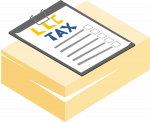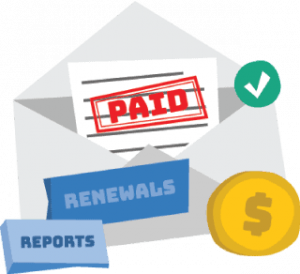South Dakota LLC Taxes
When You Want More
South Dakota LLCs are taxed as pass-through entities by default, which means the LLC does not pay federal taxes directly. Instead, the profits from the LLC pass through the business to the LLC members (owners), who then pay personal income tax on their share of the profits. LLC members’ income is taxed at the federal self-employment tax rate of 15.3% (12.4% for social security and 2.9% for Medicare). South Dakota does not levy state personal or corporate income taxes, though the LLC will most likely need to pay state sales and local taxes, as well as industry-specific taxes.
In this article, we’ll cover:


How Are South Dakota LLCs Taxed?
By default, a single-member LLC (SMLLC) is taxed as a sole proprietorship, and a multi-member LLC is taxed as a partnership. To file federal taxes as either type of LLC, you’ll need to file one of these forms:
- Single-member LLC—Form 1040 (usually Schedule C, but some SMLLCs file C-EZ, E, or F)
- Multi-member LLC—Form 1065
A South Dakota LLC can also elect to be taxed as an S-corp or C-corp. We’ll explain what that means for your LLC’s taxes.
South Dakota LLCs taxed as S-corp
Like default South Dakota LLCs, S-corps are taxed as pass-through entities. The difference between regular LLCs and LLC S-corps is how profits are distributed to members. In a regular LLC, the profits are distributed in a lump sum. S-corps can divide profits, distributing some as dividends and some as a reasonable salary. While the salary payments will be subject to self-employment taxes (15.3%), dividend distributions won’t.
In some cases S-corp election can save LLC members significant money, but it’s always a good idea to run the idea by a tax professional before you make the move. To elect S-corp taxation, your LLC will need to meet certain IRS requirements and file IRS Form 2553. S-corps report their income to the IRS by filing Form 1120-S.
LLCs taxed as C-corp
It’s not nearly as common for an LLC to elect C-corp status (the default tax status for corporations). However, some LLC owners may find that they can benefit from being taxed as a C-corp in South Dakota because C-corps are generally eligible for more tax deductions than regular LLCs. C-corps also tend to be more attractive to investors if raising money is the name of the game. C-corps need to file Form 1120 with the IRS, and they’ll have to pay the 21% federal corporate income tax. South Dakota does not have a state corporate income tax.

South Dakota State Income Tax
South Dakota has no personal income tax, which means that South Dakota LLC members only have to worry about federal income and self-employment taxes. How nice is that?

Sales and Use Tax
Every business that does business in South Dakota will need to apply with South Dakota’s Department of Revenue (DOR) in order to obtain the state sales tax license. This license will allow your LLC to collect South Dakota’s 4.5% sales tax from customers. The DOR only accepts online applications through its license application website. There is no cost to obtain a state sales tax license.

Local South Dakota Taxes
Most cities and towns in South Dakota have a local sales tax in addition to the state sales tax. Local tax rates range from 0% to 2%. For example, if your LLC does business in Camp Crook, it will need to collect 5.5% in total sales taxes (1% local, 4.5% state). Some municipalities add an extra 1% tax on lodging, restaurants, and alcohol sales. Check with your local clerk’s office where your LLC does business in order to make sure that you are collecting the correct local taxes.

Other Taxes in South Dakota
Here are a few other taxes that your South Dakota LLC may face.
South Dakota State Employer Taxes
If your LLC has employees, you’ll want to budget for South Dakota’s unemployment insurance tax. Even though workers’ compensation is not required in South Dakota, we’ll go over that as well:
- Unemployment Insurance (UI) Tax—In South Dakota, UI is referred to as Reemployment Assistance Tax, but they’re the same thing. New employers will pay 1.2% in year one or 6% if the business is involved in construction. The tax rate for years two and three drop to 1% for all employers, or 3% if involved in construction. After year three, employers can expect to pay rates between 0% and 9.3%. All employers will also be on the hook for an investment fee of up to 0.53%.
- Workers’ Compensation—There is no law in South Dakota requiring employers to carry workers’ compensation insurance. However, not having workers’ compensation insurance may be playing with fire. If an employee gets injured on the job, they can sue the business. If you think workers’ compensation is a good idea (it is), you have two options: shop around for private workers’ compensation insurance, or purchase it through the National Council on Compensation Insurance. The cost of workers’ compensation insurance is based on industry risk factors, payroll, and the number of employees being insured.
For more information on Reemployment Assistance Taxes or workers’ compensation rates and options, check out the South Dakota Department of Labor website.
Industry Taxes
While South Dakota seems generally averse to taxes, if your LLC engages in certain industries within the state, it may have to pay specific taxes. Here’s a list of a few:
- Alcohol Tax
- Contractor’s Excise Tax
- Eating Establishment Tax
- Equipment Rental Tax
- Lodging Tax
- Motor Vehicle Excise Tax
- Tobacco Tax
- Tourism Tax
- Vending Machine Tax

Do foreign LLCs in South Dakota need to pay South Dakota taxes?
Yes. A South Dakota foreign LLC (an LLC formed outside of South Dakota) can expect to be taxed just like a domestic South Dakota LLC. This means that a foreign LLC in South Dakota must register to collect South Dakota sales tax, as well as pay any other applicable taxes to the local government where the business operates.





